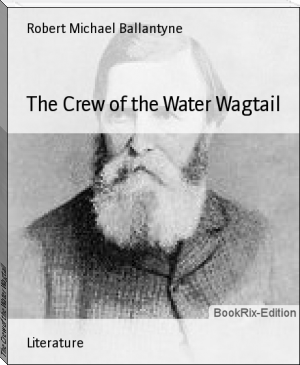The Crew of the Water Wagtail, Robert Michael Ballantyne [e reader pdf best TXT] 📗

- Author: Robert Michael Ballantyne
Book online «The Crew of the Water Wagtail, Robert Michael Ballantyne [e reader pdf best TXT] 📗». Author Robert Michael Ballantyne
"He'll be drowned or killed on the boulders below," gasped his father, running wildly down the bank of the river.
"Don't fear," said Hendrick, as he ran beside him. "There is a shallow just above the boulders. We will stop him there."
Paul Burns was already abreast of the shallow in question, and Oliver was stranded on it, but a deep rapid stream ran between it and the bank, so that Paul hesitated and looked eagerly about for the best spot to cross.
"Follow me," cried Hendrick, "I know the ford."
He led his comrade swiftly to a point where the river widened and became shallow, enabling them to wade to the tail of the bank at the top of which Oliver stood engaged in a double struggle--with the water that hissed and leaped around him, and the fish that still surged wildly about in its vain efforts to escape.
As the three men waded nearer to him they got into shallower water, and then perceived that the boy had not lost his self-possession, but was still tightly grasping the butt of his rod. Just as they came up the salmon, in its blind terror, ran straight against the boy's legs. Olly fell upon it, let go the rod, and embraced it! Happily, his friends reached him at the moment, else the water that rushed over his head would have compelled him to let go--or die!
Paul lifted him up. The great fish struggled in its captor's arms. It was slippery as an eel, and its strength tremendous. No digging of his ten nails into it was of any use. Slowly but surely it was wriggling out of his tight embrace when Hendrick inserted his great thumbs into its gills, and grasped it round the throat.
"Let go, Oliver," he said, "I've got him safe."
But Olly would not let go. Indeed, in the state of his mind and body at the moment it is probable that he could _not_ let go.
His father, having made some ineffectual attempts to clear the line, with which, and the rod, they had got completely entangled, was obliged to "stand by" and see that the entanglement became no worse. Thus, holding on each to the other and all together, they staggered slowly and safely to land with their beautiful prize.
"Are there many fish like that in these rivers?" asked Paul, as they all stood contemplating the salmon, and recovering breath.
"Ay, thousands of them in all the rivers, and the rivers are numerous-- some of them large," replied Hendrick.
"This will be a great country some day, you take my word for it," said the captain, in a dogmatic manner, which was peculiar to him when he attempted amateur prophecy.
That prophecy, however, like many other prophecies, has been only partly fulfilled. It has come true, indeed, that Newfoundland now possesses the most valuable cod-fishery in the world, and that her exports of salmon are considerable, but as to her being a great country--well, that still remains unfulfilled prophecy; for, owing to no fault of her people, but to the evils of monopoly and selfishness, as we have already said, her career has been severely checked.
Not many days after the catching of the salmon--which remained a memorable point in the career of Oliver Trench--the explorers were led by Hendrick to the shores of a magnificent lake. It was so large that the captain at first doubted whether it was not the great ocean itself.
"It is not the sea," said their guide, as he surveyed the watery expanse with evident enthusiasm. "It is a lake full fifty miles long, yet it is not the largest lake in this island. Taste its waters and you will find them sweet. Here," he added, with a look of gratification, "is my home."
"God has given you a wide domain," said Paul, gazing with pleasure on the verdant islets with which the bay before him was studded. "Yet I cannot help thinking that it is a waste of one's life to spend it in a solitude, however beautiful, when the sorrowing and the suffering world around us calls for the active energies of all good men."
The hunter seemed to ponder Paul's words.
"It appears to me," he said at last, "that our Creator meant us to serve Him by making ourselves and those around us happy. I have to do so here, and in some degree have succeeded."
As he spoke he raised both hands to his mouth and gave vent to a prolonged halloo that swept out over the calm waters of the bay.
It was quickly replied to by a shrill cry, and in a few minutes a canoe, emerging from one of the islets, was seen paddling swiftly towards them.
CHAPTER ELEVEN.
THE HUNTER'S HOME.
The canoe, which approached the shores of the lake where our explorers stood, was a large one, built after the fashion of the coracle of the ancient Britons, namely, with a frame of wicker-work covered with deerskin. It was propelled with paddles by a woman seated in the stern and a little girl in the bow.
"My wife is a woman of forethought," remarked Hendrick, with a pleased expression. "Seeing that we are a large party, she has not only brought our largest canoe, but has made Oscar get out the small one."
He pointed to the island, from a creek in which a little canoe of a reddish colour was seen to issue. It was made of birch-bark, and was propelled by a small boy, who seemed from his exertions to be in urgent haste to overtake the other craft.
"Your son, I suppose?" said Paul.
"Yes, my eldest. His younger brother is but a babe yet. These, with my daughter Goodred, and my wife Trueheart, who are now approaching, constitute the family which God has given to me."
A feeling of satisfaction filled the heart of Paul Burns as he listened to the last words, for they proved that their new friend was not among those who deem it weakness or hypocrisy in men to openly acknowledge their Maker as the Giver of all that they possess. This feeling was merged in one of surprise when the canoe touched the shore, and an exceedingly pretty child, with fair complexion, blue eyes, and curling hair, stepped lightly out, and ran to her father, who stooped to kiss her on the cheek. Hendrick was not demonstrative, that was evident; neither was his wife, nor his child. Whatever depth of feeling they possessed, the surface ran smooth. Yet there was an air of quiet gladness about the meeting which enabled Paul to understand what the hunter meant when, in a former conversation, he had said that he "made those around him happy."
"Is baby well?" he asked quickly.
"Yes, father, quite well, and I very sure wishing much that you come home soon. You been long time away."
"Longer than I expected, Goodred. And I have brought friends with me," he added, turning to his wife. "Friends whom I have found in the forest, Trueheart."
"You friends be welcome," said Trueheart, with a modest yet self-possessed air.
The woman, who advanced and held out a small hand to be shaken in European fashion, was obviously of Indian extraction, yet her brown hair, refined cast of features, and easy manner, showed as obviously the characteristics of her white father. Though not nearly so fair as her child, she was still far removed from the deep colour of her mother's race.
Before more could be said on either side the enthusiastic youngster in the bark canoe leaped ashore, burst into the midst of the group with a cheer, and began wildly to embrace one of his father's huge legs, which was about as much of his person as he could conveniently grasp. He was a miniature Hendrick, clad in leather from top to toe.
The whole party now entered the canoes, skimmed over the lake, and past the wooded islets, towards the particular island which the hunter called "home."
It was as romantic a spot as one could desire for a residence. Though only a quarter of a mile or so in diameter, the island, which was composed of granite, was wonderfully diversified in form and character. There was a little cove which formed a harbour for the hunter's canoes; bordering it was a patch of open ground backed by shrubs, above which rose a miniature precipice. The ground in the centre of the isle was rugged--as the captain remarked, quite mountainous in a small way! Hendrick had taught his children to call it the mountain, and in the midst of its miniature fastnesses he had arranged a sort of citadel, to which he and his family could retire in case of attack from savages. One peak of this mountainette rose in naked grandeur to a height of about fifty feet above the lake. Elsewhere the islet was wooded to the water's edge with spruce and birch-trees, in some places fringed with willows. On a few open patches were multitudes of ripe berries, which here and there seemed literally to cover the ground with a carpet of bright red.
On the open ground, or lawn, beside the cove, stood the hunter's hut, a small structure of rounded logs, with a door, on either side of which was a window. From those glassless windows there was a view of lake and isles and distant woods, with purple mountains beyond, which formed a scene of indescribable beauty. Close to the door, forming, as it were, a porch to it, there stood a semi-circular erection of poles covered with birch-bark and deerskins, in front of which blazed the household fire, with a tripod over it, and a bubbling earthen pot hanging therefrom. Around the inner side of the fire, under the semi-circular tent, were spread a number of deerskins to serve as couches. On one of these sat an Indian woman, with the family babe in her arms.
It was a wonderful babe! and obviously a wise one, for it knew its own father directly, stretched out its little arms, and shouted for instant recognition. Nor had it to shout long, for Hendrick, being fond of it and regardless of appearances, seized it in his arms and smothered it in his beard, out of which retreat crows and squalls of satisfaction thereafter issued.
"Excuse me, friends," said Hendrick at last, delivering the child to its mother. "I have been absent on a visit to my wife's relations, and have not seen little Ian for a long time. Sit down, and we will see what cheer the pot contains. I don't ask you to enter the hut, because while the weather is mild it is pleasanter outside. When winter comes we make more use of the house. My wife, you see, does not like it, having been accustomed to tents all her life."
"But me--I--likes it when the snow fall," said Trueheart, looking up with a bright smile from the pot, into which she had previously been making investigations.
"True--true. I think you like whatever I like; at least you





Comments (0)